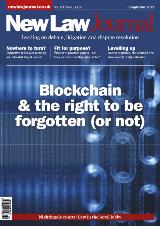THIS ISSUE

Interim relief in whistleblowing claims: James Hockley, Clare Brereton & Polly Rodway weigh commercial embarrassment against the open justice principle
Law in the hotel lobby: David Langwallner examines the dilemmas arising from the relocation of trials to temporary courtrooms
Time to nip & tuck your web presence? Andy Cullwick offers insight into cracking the secrets of the Google rankings
Dean Armstrong QC & Paul Schwartfeger, 36 Commercial, consider how organisations can & should respond to erasure requests on blockchain
Alec Samuels discusses the pressing need for compromise between protesters & the public
Possession notices not so secure; Court rise at the Hilton; Appeal clarification; CPR update goes tender; New committal form; Family catch up on truth
Neil Parpworth explores the narrow options for injunctive relief when facing an unlawful stop & search
In the third instalment of this series, Roger Smith tackles access to justice, the courts & the slow march of digitalisation
MOVERS & SHAKERS

Jackson Lees Group—Jannina Barker, Laura Beattie & Catherine McCrindle
Firm promotes senior associate and team leader as wills, trusts and probate team expands

Asserson—Michael Francos-Downs
Manchester real estate finance practice welcomes legal director

McCarthy Denning—Harvey Knight & Martin Sandler
Financial services and regulatory offering boosted by partner hires
NEWS
The cab-rank rule remains a bulwark of the rule of law, yet lawyers are increasingly judged by their clients’ causes. Writing in NLJ this week, Ian McDougall, president of the LexisNexis Rule of Law Foundation, warns that conflating representation with endorsement is a ‘clear and present danger’
The Supreme Court has drawn a firm line under branding creativity in regulated markets. In Dairy UK Ltd v Oatly AB, it ruled that Oatly’s ‘post-milk generation’ trade mark unlawfully deployed a protected dairy designation. In NLJ this week, Asima Rana of DWF explains that the court prioritised ‘regulatory clarity over creative branding choices’, holding that ‘designation’ extends beyond product names to marketing slogans
From cat fouling to Part 36 brinkmanship, the latest 'Civil way' round-up is a reminder that procedural skirmishes can have sharp teeth. NLJ columnist Stephen Gold ranges across recent decisions with his customary wit
Digital loot may feel like property, but civil law is not always convinced. In NLJ this week, Paul Schwartfeger of 36 Stone and Nadia Latti of CMS examine fraud involving platform-controlled digital assets, from ‘account takeover and asset stripping’ to ‘value laundering’
Lasting powers of attorney (LPAs) are not ‘set and forget’ documents. In this week's NLJ, Ann Stanyer of Wedlake Bell urges practitioners to review LPAs every five years and after major life changes







